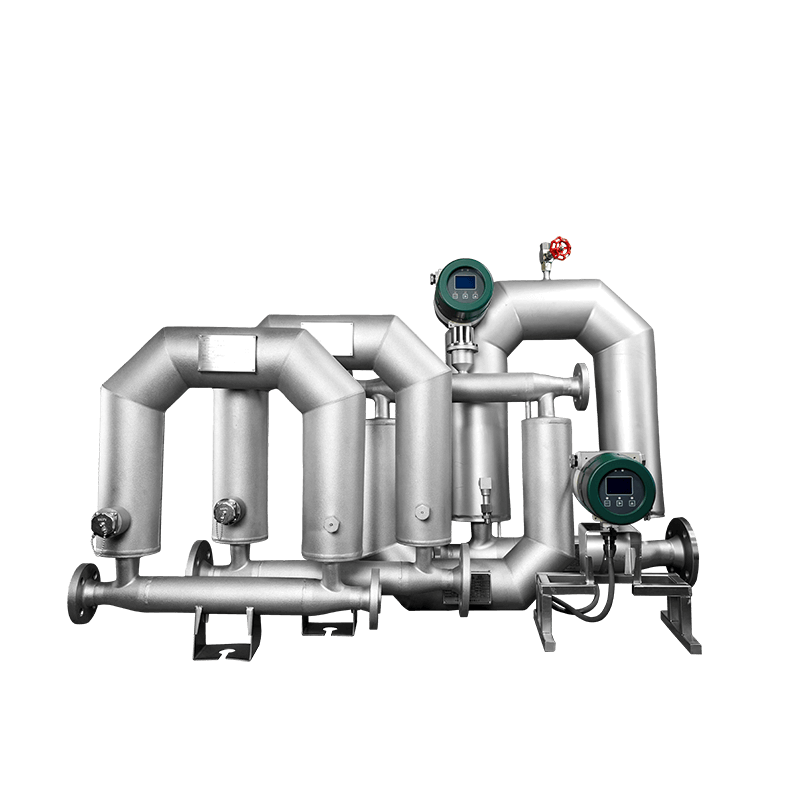What is a flow meter?
The flow meter is an instrument used to measure the flow of fluid in a pipe. Flow meters are used in various industries. Such as industrial production, environmental protection and transportation, etc. Flow meters use many calculation methods to provide accurate measurement results.
Flow meters are designed to measure flow with accuracy, stability and resolution. Flow meters can operate in closed systems (pipeline systems) and open systems (canals and rivers). Flow meters usually consist of primary and secondary instruments.
The primary instrument is installed inside or outside the pipeline. It generates a signal that has a certain relationship with the flow rate according to the physical laws of the interaction between the fluid and the pipeline. This primary instrument is also called a flow sensor. The secondary instrument gives the corresponding flow value (it is an instrument installed on the dashboard).

How the flow meter works?
Generally speaking, a flow meter is a precision metering instrument. A flow meter uses the principles of fluid physics to measure flow. It can measure the flow of the medium. It includes the flow measurement (liquids and gases)of pipe networks.
Measurement principle: Traditional flow meters measure flow by calculating the relationship between flow and pressure. It can be divided into volumetric measuring instruments and pressure measuring instruments.
Working principle: Simple flow meters generally use dual-medium volumetric precision measurement technology. When the fluid passes through the volume measurement cavity, there will be a volume change or a gas pressure change. And then the change value and the flow value are converted using a corresponding relationship.

What is the Benefits of a Flow Meter?
Flow meters can accurately measure and ensure fair distribution.
- Flow meters can optimize operating costs and improve economic benefits.
- Flow meters can strengthen safety supervision and prevent accident risks.
- Flow meters promote efficient resource allocation.
- Flow meters support green and low-carbon development.
- Flow meters help build smart cities.
Flow meters are not only the basic tools for ensuring efficient resource utilization and public safety in zoning management, but also the key technical support for improving the business environment and promoting high-quality economic and social development. With the advancement of science and technology and the deepening of its application, flow meters will demonstrate their value in more dimensions and help build a more efficient, fair and green modern city and business environment.

Common Flow Meter Types
According to the measurement principle, flow meters are divided into: mechanical principle、thermal principle, acoustic principle, electrical principle, optical principle, atomic physics principle, etc.
According to the most popular and widely used classification method. Flow meters are divided into:
- Positive displacement gear flow meter,
- Differential pressure flow meter,
- Float flow meter,
- Turbine flow meter,
- Electromagnetic flow meter,
- Vortex flow meter,
- Mass flow meter
The principles, characteristics and applications of various flow meters are introduced in detail on this website. Please click the link above.

Features of Flow Meter
- High precision
- Strong adaptability
- Combination of intelligence and digitization
- Low maintenance cost
- Easy installation
- Multi functionality
- Environmental protection and energy saving
How to Choose a Suitable Flow Meter?
Clarify the measurement requirements
Determine the measurement type:
Instantaneous flow:
used in situations where real-time control is required. Such as continuous proportioning production or process control of pipelines.
Total amount (cumulative flow): used in situations where the total amount needs to be measured. Such as batch production of filling containers, trade accounting, storage and transportation distribution, etc.
Determine the measurement range:
Select a flow meter with corresponding upper and lower flow limits according to the flow range of the measured pipeline.
Note that the measurement range of the flow meter should cover the actual flow to avoid exceeding the range and causing inaccurate measurement or damage to the flow meter.
Understand the fluid characteristics
Fluid composition:
Select a suitable flow meter according to the fluid composition. For example, when measuring corrosive fluids, a flow meter made of corrosion-resistant materials should be selected.
Temperature and pressure:
Define the working temperature and pressure of the fluid. Especially when measuring gas, changes in temperature and pressure may cause changes in density. Thereby affecting the measurement accuracy.
If temperature and pressure corrections are required, a flow meter with corresponding functions should be selected.
Density and viscosity:
In most liquid applications, the liquid density is relatively stable. But in some gas applications, density changes may affect the measurement performance of the flow meter.
Viscosity changes may affect the measurement range and accuracy of the flowmeter. A suitable flow meter should be selected according to the fluid viscosity.
Consider installation requirements
Installation location:
Select a flow meter location that is easy to install, maintain and read data.
Avoid the influence of fluid disturbance and eddy current on measurement, and ensure that there are enough straight pipe sections before and after the flowmeter.
Installation method:
Select a suitable installation method according to the actual situation on site, such as horizontal installation, vertical installation, or inclined installation.
Ensure that the connection between the flowmeter and the pipeline is tight and reliable to avoid problems such as leakage and vibration.
Evaluate environmental conditions
Temperature and humidity:
Consider the impact of ambient temperature and humidity on the flow meter, and select a flow meter that adapts to these conditions.
Corrosiveness:
If the environment is corrosive, a flow meter made of corrosion-resistant material should be selected.
Consider economic efficiency
Cost budget:
Select a suitable flow meter according to the cost budget to avoid unnecessary waste.
Cost performance:
Select a flow meter with high cost performance on the premise of meeting performance requirements.
Comprehensive evaluation of performance indicators
Accuracy:
Select the appropriate accuracy level according to the measurement requirements. For example, trade accounting, storage and transportation handover and other occasions may require a flow meter with higher accuracy.
Repeatability:
Repeatability is an important indicator in process control applications, which is determined by the principle and manufacturing quality of the instrument itself.
Linearity:
For instruments with a wide flow range, pulse output used for total accumulation, linearity is an important indicator. Poor linearity may reduce the accuracy of the instrument.
Pressure loss:
Consider the impact of pressure loss generated by the flow meter on process efficiency, especially for water delivery instruments with larger pipe diameters.
Output signal characteristics:
Select the appropriate output signal type and amplitude according to the requirements of control interfaces, data recorders, alarm devices and other equipment.
Response time:
When applied to pulsating flow places, attention should be paid to the response speed of the instrument to flow step changes.

Sino-Inst is a professional flow meter manufacturer with rich experience in this field. We are constantly improving our technology to meet the evolving challenges of the industrial world. If you need a reliable flow meter solution. Please contact our team. Choose a suitable flow meter that can operate at low flow rates and is compatible with most industrial chemicals and gases.








